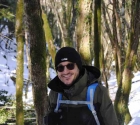La relazione tra mindfulness in scenari naturali virtuali e awe: principali evidenze in letteratura e nuove prospettive di ricerca
Kabat-Zinn, J. (2015). Mindfulness. Mindfulness, 6(6), 1481–1483. https://doi.org/10.1007/s12671-015-0456-x
Kallapiran, K., Koo, S., Kirubakaran, R., & Hancock, K. (2015). Effectiveness of mindfulness in improving mental health symptoms of children and adolescents: a meta‐analysis. Child and Adolescent Mental Health, 20(4), 182-194. https://doi.org/10.1111/camh.12113
Kaplan, S. (1995). The restorative benefits of nature: Toward an integrative framework. Journal of Environmental Psychology, 15(3), 169-182. https://doi.org/10.1016/0272-4944(95)90001-2
Keltner, D., & Haidt, J. (2003). Approaching awe, a moral, spiritual, and aesthetic emotion. Cognition and Emotion, 17(2), 297-314. https://doi.org/10.1080/02699930302297
Ma, J., Zhao, D., Xu, N., & Yang, J. (2023). The effectiveness of immersive virtual reality (VR) based mindfulness training on improvement mental-health in adults: A narrative systematic review. Explore, 19(3), 310–318. https://doi.org/10.1016/j.explore.2022.08.001
Menardo, E., Brondino, M., Hall, R., & Pasini, M. (2021). Restorativeness in natural and urban environments: A meta-analysis. Psychological Reports, 124(2), 417-437. https://doi.org/10.1177/0033294119884063
Mistry, D., Zhu, J., Tremblay, P., Wekerle, C., Lanius, R., Jetly, R., & Frewen, P. (2020). Meditating in virtual reality: Proof-of-concept intervention for posttraumatic stress. Psychological Trauma: Theory, Research, Practice, and Policy, 12(8), 847. https://doi.org/10.1037/tra0000959
Rankin, K., Andrews, S. E., & Sweeny, K. (2020). Awe-full uncertainty: Easing discomfort during waiting periods. The Journal of Positive Psychology, 15(3), 338–347. https://doi.org/10.1080/17439760.2019.1615106
Shiota, M. N., Keltner, D., & Mossman, A. (2007). The nature of awe: Elicitors, appraisals, and effects on self-concept. Cognition and Emotion, 21(5), 944-963. https://doi.org/10.1080/02699930600923668
Shiota, M. N., Thrash, T. M., Danvers, A. F., & Dombrowski, J. T. (2017). Transcending the self: Awe, elevation, and inspiration. In M. M. Tugade, M. N. Shiota, & L. D. Kirby (Eds.), Handbook of positive emotions (pp. 362–377). Guilford Press.
Steg, L., Van Den Berg, A. E., & De Groot, J. I. (2018). Environmental Psychology: An introduction. Wiley.
Theodorou, A., Romano, L., Bratman, G. N., Carbone, G. A., Rodelli, R., Casagrande, G., & Panno, A. (2023). Different types of virtual natural environments enhance subjective vitality through restorativeness. Journal of Environmental Psychology, 87, 101981. https://doi.org/10.1016/j.jenvp.2023.101981
Ulrich, R. S., Simons, R. F., Losito, B. D., Fiorito, E., Miles, M. A., & Zelson, M. (1991). Stress recovery during exposure to natural and urban environments. Journal of Environmental Psychology, 11(3), 201-230. https://doi.org/10.1016/S0272-4944(05)80184-7
Yaden, D. B., Haidt, J., Hood Jr, R. W., Vago, D. R., & Newberg, A. B. (2017). The varieties of self-transcendent experience. Review of General Psychology, 21(2), 143–160. https://doi.org/10.1037/gpr0000102
Yaden, D. B., Iwry, J., Slack, K. J., Eichstaedt, J. C., Zhao, Y., Vaillant, G. E., & Newberg, A. B. (2016). The overview effect: Awe and self-transcendent experience in space flight. Psychology of Consciousness: Theory, Research, and Practice, 3(1), 1-11. https://doi.org/10.1037/cns0000086
Yaden, D. B., Kaufman, S. B., Hyde, E., Chirico, A., Gaggioli, A., Zhang, J. W., & Keltner, D. (2019). The development of the Awe Experience Scale (AWE-S): A multifactorial measure for a complex emotion. The Journal of Positive Psychology, 14(4), 474–488. https://doi.org/10.1080/17439760.2018.1484940
Autore/i dell'articolo
Parole chiave dell'articolo
Articolo in pdf
Newsletter
Keep me updated about new In-Mind articles, blog entries and more.





